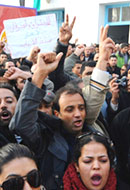Arab Stirrings

On January 14, the strongman of Tunisia, Zine al-Abidine Ben Ali, fled in panic to Saudi Arabia after the astonishingly spontaneous, Facebook-driven crumbling of his corrupt regime. On January 25, Hizballah—the terrorist strongmen of Lebanon—grabbed the reins of power in that beleaguered country. Between them, these two opposing events describe the present arc of crisis and tumult in the Arab world.
History will record that the impetus in Tunisia was the December 17 self-immolation of Mohamed Bouazizi, a harassed and despondent twenty-six-year-old fruit vendor in the country's rough interior. Copycat suicides soon followed in Cairo and Algiers, and anti-government protests in Jordan and Morocco. Ayman Nour, the reformist Egyptian politician, wondered hopefully whether Egypt might follow the Tunisian model; within days, mass demonstrations in that country would be raising hopes even higher. In the West Bank, an alarmed Palestinian Authority barred rallies in support of the Tunisian overthrow. Even Amr Musa, chief of the Arab League, acknowledged what events in Tunisia had exposed: that poverty, unemployment, and frustration had broken the entire "Arab soul."
In the last days, Arabs and foreigners alike have been asking whether the Tunisian upheaval augurs a domino-like series of Jasmine Revolutions—and, at long last, the emergence of regional democracy. By this, they do not mean the all too familiar and false democracy of "one man, one vote, one time," à la Hamas's lopsided victory in the 2006 Palestinian elections, Hizballah's 2009 capture of 88 percent of the Shi'ite vote in Lebanese balloting, or the 1992 elections in Algeria, won, against all expectations, by the extremist Islamic Salvation Front. Rather, they have in mind a genuine movement of political institution-building that will ensure pluralism, civil liberties, and the rule of law.
In thinking about the current situation, however, it is well to bear in mind that despite the Western tendency to treat Arab countries as one undifferentiated mass, each has its own unique circumstances. Tunisia, the test case of the moment, is relatively well-off and demographically cohesive, with notably educated elites. Although the country's interior is depressed, the coast has experienced sustained economic growth.
Indeed, as the consummate foreign correspondent Robert D. Kaplan has emphasized, Tunisia boasts a history of prosperity and stability, a post-colonial political culture of secularism, and a legacy of political moderation shaped by its founder Habib Bourguiba. In fact, Kaplan ascribes Tunisia's current troubles to the flip side of its comparative achievements: namely, the failure adequately to meet the rising expectations of a populace whose median age is twenty-nine.
Could, then, the country switch from the "not free" to the "free" camp? Cautiously, Kaplan concludes that "Despite all [its] advantages . . . , Tunisia's path forward is treacherous." His caution is well taken. For one thing, there is no coherent political opposition in Tunisia, much less one led by democrats. Moreover, it is too soon to know what role, if any, will be played by Islamists. For now, they are not in the vanguard of the struggle, and those who have emerged after decades of government persecution claim to stand for a distinctively moderate strain. Things may become clearer if and when Rachid al-Gannushi, the seventy-year-old leader of the Islamist "Renaissance party," returns to Tunis from his London exile and the extent of his group's influence can be gauged. Gannushi, with ties to Iran, violently opposes the existence of Israel.
Elsewhere, the path forward is even more treacherous. No Arab land, even taking into account the still highly uncertain case of post-Saddam Iraq, has shown itself to be fertile ground for Western-style democracy. Everywhere, voices calling for democratic reform and groups championing civil society are weak. Autocratic leaders like Hosni Mubarak in Egypt have snuffed out freedom-minded dissent perhaps even more aggressively than they have crushed challenges from the Islamists.
To some seasoned observers, events in Tunisia can be seen as sending a warning signal to Syria, Libya, Egypt, and (non-Arab) Iran that, in the words of the North Africa specialist Michael Laskier, "they could be next in line." But how each of those regimes react is very much an open question. Will it permit evolutionary change? Will dissident movements be hijacked by old-guard politicians or by returning Islamists? Will the democratic impulse fizzle out as army generals seek to restore order? No less important—indeed, crucially so—is whether the Western democracies, and above all the United States, throw their considerable weight behind the reformers or behind the autocrats.
Israelis, watching from afar, may nostalgically recall that Tunisia's Bourguiba was among those who early on favored Arab-Israel peace (though he also provided sanctuary to Yasir Arafat after the latter's 1982 ouster from Lebanon) and allowed his country's 100,000 Jews to leave for France and Israel. Under Ben Ali, Israelis have been able to travel to Tunisia on their own country's passports. So no nation would be happier to see Arab democracy take root in moderate Tunisia, or for it to serve as a beacon for the entire region.
But then there are all the obstacles between here and there. And there is Lebanon: a warning if ever there was one against the tendency to indulge in wishful thinking.
Comments are closed for this article.




